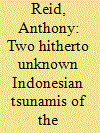| Srl | Item |
| 1 |
ID:
144098


|
|
|
|
|
| Summary/Abstract |
This article examines one Cambodian village's efforts to resettle a war-altered landscape and reconstruct a sense of belonging in the aftermath of war. The resettlement of Reaksmei Songha village entailed physically settling over the sediments and traces of a fractured and violent past, as settlers cleared a landscape of foliage and the explosive remnants of war. Settlers living side by side had often fought on different sides of the war, yet divisive former allegiances were rarely discussed. Instead, a post-war sense of communal belonging was constructed through references to accounts of the resettlement period, focusing upon common elements of struggle and hardship.
|
|
|
|
|
|
|
|
|
|
|
|
|
|
|
|
| 2 |
ID:
144097


|
|
|
|
|
| Summary/Abstract |
This article discusses the ongoing hybrid war crimes tribunal taking place in Cambodia — in the Extraordinary Chambers in the Courts of Cambodia (ECCC) — in relation to the simultaneous eviction of the Boeung Kak Lake community in the capital, Phnom Penh. Presenting these two phenomena alongside one another highlights the contradiction inherent in the liberal peace model's humanitarian rhetoric of societal reconstruction and its economic imperatives, which serve the interests of the elites. The material discussed here suggests that so-called transitional justice interventions may accompany a period of stabilisation, which is good for the global market, but do little to enhance fairness and peace for ordinary people.
|
|
|
|
|
|
|
|
|
|
|
|
|
|
|
|
| 3 |
ID:
144100


|
|
|
|
|
| Summary/Abstract |
From the mid-nineteenth century onwards there developed in the British colonies a distinctive set of forestry practices that came to be described as Empire forestry. These practices grew out of the same milieu as imperialism, and had their earliest expression in British India. Gregory Barton argues that Empire forestry also heavily influenced the forestry of the United States and that from there it spread to the Philippines. However, this article argues that the variant of Empire forestry developed in the Philippines was not particularly successful as its proponents failed to adequately adapt it to local social and political conditions.
|
|
|
|
|
|
|
|
|
|
|
|
|
|
|
|
| 4 |
ID:
144102


|
|
|
|
|
| Summary/Abstract |
Our recent discovery and excavation of a series of iron smelting furnaces, dated to the eighth and ninth century CE, near upland Rmet villages in northwest Laos, potentially sheds new light on the role of regional upland groups during the immediate pre-Tai period. The oral tradition associated with these furnaces emphasises the role of an ancient population of metallurgists who left the area under pressure from the Rmet. These stories could refer to the actual arrival and departure (immigration and emigration) of a population of metallurgists in that area sometime during the second half of the first millennium CE or they can support the scenario of a dissimilation process. The latter would explain the existence of a Rmet subculture that the locals regard as ‘Chueang Lavae’ villages, a differentiation that Karl G. Izikowitz had labelled ‘Upper Lamet’ in the 1930s. Our finds show that archaeology and ethnology can both contribute to a much-needed reformulation of upland Lao history.
|
|
|
|
|
|
|
|
|
|
|
|
|
|
|
|
| 5 |
ID:
144099


|
|
|
|
|
| Summary/Abstract |
Does Thailand still have peasants? Does it still have a peasant society? How dynamic are Thailand's chaona? To answer these questions we begin with an interview of a septuagenarian farmer who discusses rural change over his lifetime and provocatively claims he is ‘the last peasant’ of his village. We use this rural anecdote as a catalyst to highlight agrarian change in Thailand and to expose the hazards of employing static concepts to describe contemporary rural political economy. By analysing the use and meanings of the term ‘peasant’ and its Thai equivalents, we demonstrate how static concepts obscure Thailand's rural evolution and contribute to misleading assumptions, harmful agrarian myths, and extant political cleavage.
|
|
|
|
|
|
|
|
|
|
|
|
|
|
|
|
| 6 |
ID:
144101


|
|
|
|
|
| Summary/Abstract |
The 2004 tsunami intensified fruitful scientific research into dating past tectonic events in Sumatra, though without comparable work on Java. Geology needs to be informed by careful historical research on documented events, but less such work has been done in Indonesia than in other tectonically endangered areas. This paper examines the historical evidence for two hitherto unknown tsunamis of the seventeenth century. In better-researched Sumatra, Dutch reports that a flood from the sea devastated Aceh in 1660 adds to what the geologists have discovered on the ground. By contrast geological research has barely begun on the south coast of Java. Javanese sources for events before 1800 need careful re-evaluation. The myths around Ratu Kidul, the ‘Queen of the South Seas’, together with more chronologically reliable dated babads, point to a major tsunami in 1618 on the coast south of Yogyakarta.
|
|
|
|
|
|
|
|
|
|
|
|
|
|
|
|